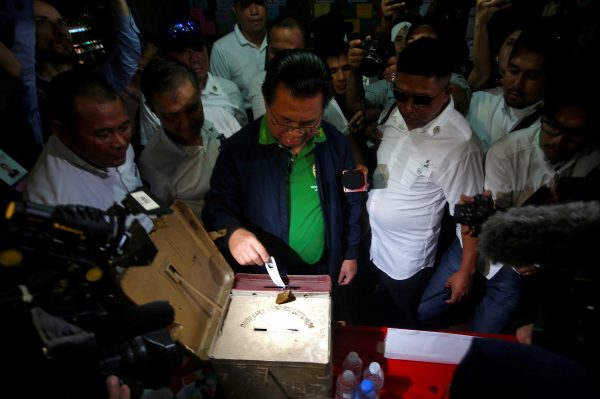The creation of the BARMM marks the end of decades of armed conflict between Muslim insurgents and the Philippine central government. The inauguration of the Bangsamoro Transition Authority (BTA), tasked to govern the region during the three-year transition period, was heralded a ‘new dawn’ for Mindanao.
The BOL has assigned various responsibilities to the BTA, including enacting fundamental codes such as the Bangsamoro Administrative Code and the Bangsamoro Local Government Code. But as of April 2020, none of this priority legislation has been passed.
Still, the BTA has demonstrated the resolve to create a stable economic environment for the BARMM. Three achievements for 2019 bode particularly well for the region’s economic prospects.
The first is the Bangsamoro Energy Forum, which initiated efforts to develop sustainable energy sources in the region. Second is the Bangsamoro Tourism Stakeholders’ Summit, which signified the importance of tourism in grassroots development. And third is a high investment record for the BARMM, which indicates growing business confidence.
BARMM’s status as the poorest region in the country could dramatically change within the decade if the BTA continues laying down strong foundations for the first elected Bangsamoro Parliament in 2022.
As per the BOL, the BTA is also tasked with managing the creation of a parliamentary government in the BARMM. There are three ways to get elected to the Bangsamoro Parliament: through a system of proportional representation, in single-member parliamentary districts or as designated sectoral representatives.
The specific mechanics of these three paths to the Bangsamoro Parliament shall be established in a Bangsamoro Electoral Code, which has yet to be enacted by the BTA.
The Bangsamoro Parliament is unusual compared to other subnational governments in Southeast Asia because it does not mirror the form of government at the national level. The Bangsamoro regional government is mandated by law to be a parliamentary system, even though the Philippine national government is presidential.
Setting up a parliamentary government essentially from scratch is not without its challenges. One daunting complexity pertains to the central role of political parties in parliamentary elections and governance.
This deserves to be highlighted because political parties in the Philippines tend to be ‘coalitions of provincial bosses, political machines, and local clans, anchored on clientelistic, parochial, and personal inducements rather than on issues, ideologies, and party platforms’. Notably, the 2019 figures of the Ateneo Policy Center’s Political Dynasties Dataset indicate that the BARMM is dominated by ‘fat dynasties’ — families of politicians simultaneously holding public office. Multiple members of the clan all participate in elections at the same time, running for different posts.
Lower standards of living, lower human development and higher levels of deprivation and inequality persist in the districts governed by local leaders who are members of a political dynasty. Worse, ‘fat dynasties’ are ensconced in the poorest parts of the country.
The prevalence of fat political dynasties in the BARMM is an alarming red flag. Political parties in the region that will participate in the parliamentary elections in 2022 could be dominated by political dynasties. The Bangsamoro Parliament could be filled with members inherently distinguished by ‘clientelistic, parochial, and personal inducements’.
Such a cohort controlling the first elected Bangsamoro Parliament in 2022 would certainly diminish the chances of the region fulfilling its economic growth aspirations.
How can this outcome be mitigated, or if possible, avoided completely?
There is no silver bullet for this problem but the BOL does provide guidance via the mandate that ‘the Bangsamoro Autonomous Region shall have a democratic political system that allows its people to freely participate in the political processes within its territorial jurisdiction’ (Article IV, Section 3).
This law is an imprimatur for civil society organisations (CSOs) to play a prominent role in preparing the Bangsamoro people for the parliamentary elections in 2022.
CSOs can contribute significantly in generating the foundational ethos of the new regional government because they have the wherewithal to get communities in the BARMM deeply engaged in the formation process. Many CSOs have the technical expertise to conduct vibrant and inclusive public deliberations where participants with different views and concerns have a chance to be heard.
What is unique about how these CSOs manage public forums is that even if no consensus is ever reached, people still come out of the discussion with a better and more complete understanding of the subject matter deliberated upon. CSOs can keep the line of communication within a group of diverse views and interests connected, meaning there will always be a potential for collective action.
Community organising in the BARMM is not easy given ongoing security risks. The Muslim insurgency may have ended but terrorism and violent extremism are still high-level threats that CSOs in the BARMM will have to deal with from day to day.
Nonetheless, CSOs in the BARMM make perfect allies for reform-driven political parties or as outright political parties themselves. They can contribute significantly in the creation of a Bangsamoro Parliament that is anchored in an actively engaged electorate rather than being under the control of political dynasties.
There are currently at least 90 CSOs active in the BARMM with different advocacy agendas and diverse constituencies. Most are doing grassroots work to help Bangsamoro communities during the transition period. Quite a few are also gearing up for the 2022 parliamentary elections.
It is still too early to forecast how political dynasties in the BARMM will react to the entry of CSOs in parliamentary politics. But what is clear now is that the Bangsamoro people have a way to establish the kind of parliament that can secure their long-term economic aspirations.
Michael Henry Yusingco is a non-resident research fellow at the Ateneo Policy Center, Ateneo de Manila University, and at the Institute of Autonomy and Governance in the BARMM.

